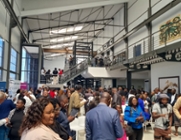Southern Africa local government meets

03 July 2019
CLGF’s recent Southern Africa Regional Conference has attracted praise from members and participants alike.
Held in Lusaka, Zambia on 25 and 26 June, the theme - Promoting Local Governance and LED in Southern Africa – brought together a range of local government stakeholders from many countries to look at the impact of LED on development work. Conclusions of the event as a whole can be found in the full Outcomes Statement.
The official opening address was provided by Hon Vincent Mwale, Zambia’s Minister of Local Government; followed by welcome speeches from Mr Amos Malupenga, Permanent Secretary, Zambia’s Ministry of Local Government; Cllr Christopher Kang'ombe, Mayor of Kitwe and President of the Local Government Association of Zambia (LGAZ); Emeline Dicker, Deputy Head of Office, UK Department for International Development (DFID); and Cllr Rev Mpho Moruakgomo CLGF Chairperson and president of Botswana Association of Local Authorities (BALA).
Local to national
CLGF Secretary-General Dr Greg Munro thanked Hon Minister Mwale for the strong commitment shown by Zambia to decentralisation and for recognising the role and support of CLGF via its programmes and networks. With the support of DFID UK, the outcomes of the programme mean that LED Guidelines are now being rolled out across Zambia: local to national, a truly bottom-up approach. Dr Munro told participants: “This is a good reminder of why local government must be involved in achieving the Sustainable Development Goals (SDGs) and that LED is a key entry point for localising national and international goals and ensuring sustainable development.”
People, prosperity, peace, planet, partnership
Nyasha Mawokomatanda Simbanegavi, CLGF Southern Africa Programme Officer introduced the conference background paper, which stressed the important link to the SDGs of the 5Ps: People, Prosperity, Peace, Planet, Partnership - and the role of Local Government in delivering global agendas at the local level.
Economist Astrid Haas from the International Growth Centre explained that African economies continue to be dominated by informality; with 93% of informal businesses operating below the poverty line and 70% run by women. The response of CLGF Deputy Secretary-General Lucy Slack was to explain that this underlines the importance of empowering local governments to make investments at the city level and encourage investment in the formal sector. Haas continued that two thirds of African cities are still to be built, and this provides a great opportunity; but empowerment of local government is required to make critical, timely decisions, especially when it comes to economic development.
Women in local government country chapters
Gender was a key topic for the event. Welcoming the opportunity to explain more to Southern Africa members about the work of the Commonwealth Women in Local Government Network (ComWLG). CLGF DSG Lucy Slack described how the network is supporting the empowerment of women via country chapters.
In her presentation, Colleen Lowe Morna, thanked CLGF members for taking gender equality to the local level, where she believes it matters most, and for emphasising that it is not only about women’s access to local government, but also about empowerment to see change in service delivery. Ms Lowe Morna is CEO of Gender Links, the organisation with which CLGF will partner on a three-year project focusing on women in policy/leadership in Lesotho, Swaziland, Zambia and Zimbabwe.
ICT bridging the gap
Programme Manager Claire Frost presented CLGF's overview on ICT for women's political empowerment. She explained: “The digital divide disproportionally impacts Women, but ICT also provides new tools to access decision-making. ICT can help bridge the gender gap and provide better services.” This heralded in an invigorating debate on gender parity in local government: how to level the playing field, change electoral systems, truth to power, women as agents and men as allies – all very interesting and important issues.
Further sessions looked at Rolling out LED as a tool for poverty reduction and achieving the SDGs; with panels on Localising Sustainable Development Goals and National Development Plans through Decentralisation and LED. Representatives of the Ministries responsible for local government in Botswana, Namibia, Swaziland, South Africa and Zambia came together to look at creating an enabling policy, legal and regulatory environment for local government.
The practical element of the conference came from a number of local governments who described their Project Impact Stories, or strategies in action, that are bringing real benefits and change. This included:
• Rolling out LED in Zambia: Good practice arising from implementing LED Guidelines – LGA, Zambia and Kitwe City Council;
• Resource mobilisation through LED: Mbire District Council, Zimbabwe;
• Reducing poverty through support for community-based initiatives: Municipalities of Mbabane and Manzini, Eswatini;
• Leveraging resources through value chains mapping and business planning: Chobe & Kgalagadi District Councils, Botswana; and
• Regional Approaches to Economic Development: South Africa Local Government Association.
DSG Lucy Slack said: “The event was successful for many reasons: it allowed members to come together and share their experiences. As an organisation, CLGF has been able to assess how far we have come with LED in South Africa and look at where CLGF can provide additional support to ‘institutionalising’ LED. Another benefit to the event was bringing several of our partners together such as the DFID, the EU, GIZ and UNCDF."
Read more about the conclusions of the regional conference in the full Outcomes Statement.
Back to News





